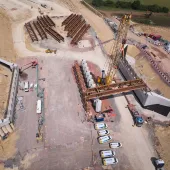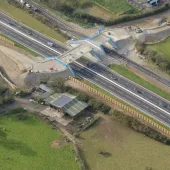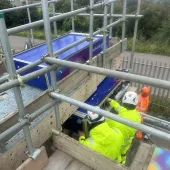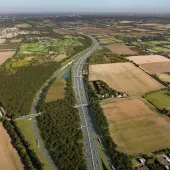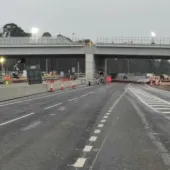Asphalt concrete binder course trial starts
National Highways is trialing a new carbon-negative aggregate on the M11 motorway as part of its effort to reduce its carbon footprint. The innovative construction material emerged from a competition run by National Highways, which provided funding for projects aimed at achieving net zero carbon in maintenance and construction.
Four Companies received up to £80,000 each to develop their ideas. One of these firms, Seaham-based Low Carbon Materials, is now trialing its ACLA carbon-negative aggregate on a section of the M11 northbound carriageway in Essex, with support from Skanska and Tarmac.
The trial is part of essential resurfacing and maintenance work between junctions 7 and 8 and will be closely monitored by National Highways to assess its performance under heavy traffic conditions.
A test strip of asphalt concrete binder course containing Low Carbon Materials' product has been laid alongside a control strip using conventional aggregate. The aim is to evaluate if the carbon-negative aggregate can significantly reduce National Highways’ carbon emissions with minimal changes to standard procedures.
Dr Joanna White, National Highways’ research, development and innovation director, said: “Solutions like this could have a real impact on our road to net zero carbon. We’re delighted to accelerate the development of this product and test it on one of our roads. Collaboration is key to innovation, and we’re grateful to Skanska and Tarmac for their support. Testing the asphalt in real conditions on a busy motorway will help us prove its durability and effectiveness.”
National Highways launched the Accelerating Low Carbon Innovation competition last year in collaboration with Connected Places Catapult. The initiative is part of Designated Funds, dedicated to investing in projects that deliver lasting benefits for road users, the environment, and communities across England.
Low Carbon Materials CEO, Natasha Boulding, expressed gratitude for the support in piloting ACLA: “We're excited about National Highways' recognition of our carbon-negative aggregate. This motorway trial is a significant step towards lower carbon roads and wider adoption. ACLA offers a simple and scalable solution that can help National Highways achieve its net zero targets.”
Paul Cole, Skanska’s chief engineer, praised the programme, stating: “The Accelerating Low Carbon Innovation programme exceeded my expectations, creating a strong collaborative relationship between Skanska, Tarmac, and Low Carbon Materials. Bringing LCM’s new product to market quickly has been very successful, with support from National Highways’ Safety, Engineering, and Standards teams. Achieving this in eight months is amazing.”
Tim Smith, Tarmac’s senior technical manager (South East), added: “Working towards net zero is a priority for Tarmac and our clients. Fast-tracking this new material to a trial on the strategic network in record time shows how our industry can quickly develop and test innovations.”
Alex Weedon, executive director of SME development and academic engagement at Connected Places Catapult, said: “I’m delighted for Low Carbon Materials to trial its innovative aggregate on the National Highways network. Our programme has supported innovative companies with investment, business, and marketing assistance, helping them bring their innovations to real-world environments.”
For more information about the low carbon programme, visit the Connected Places Catapult page, or for details on National Highways competitions, visit the National Highways website.


